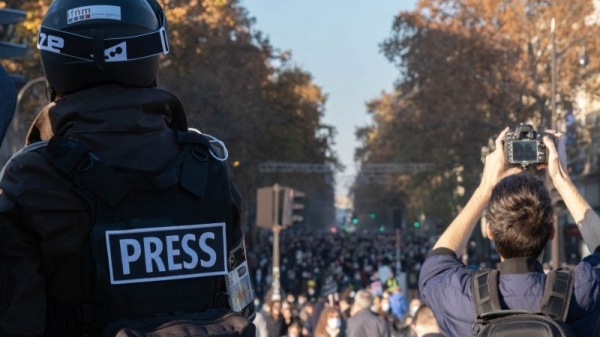Mixed picture for Europe’s press freedom in year shaped by war – report

Disparities between the rankings of EU states have declined in Reporters Without Borders’ (RSF) 2023 Press Freedom Index, but the war in Ukraine has shaped many of the past year’s trends in the region.
In this year’s Index, which annually tracks press freedom around the world, twice as many EU member states were found to have risen as had fallen, with Europe regarded as the region of the world in which it is easiest to work as a journalist, overall.
Russia’s war against Ukraine was found to have positively contributed to press freedom in several European countries beyond those most immediately involved in the conflict. The report also notes the impact of propaganda and the fake content industry on the press.
On a global level, the Index shows extreme volatility, with unprecedented rises and declines by some countries.
“This instability is the result of increased aggressiveness on the part of the authorities in many countries and growing animosity towards journalists on social media and in the physical world,” said Christophe Deloire, RSF’s Secretary-General.
“The volatility is also the consequence of growth in the fake content industry, which produces and distributes disinformation and provides the tools for manufacturing it,” he added.
Press freedom "problematic" in almost 40% of Europe & Central Asia
Almost 40% of Europe and Central Asia are in a “problematic” press freedom situation, according to the Reporters Without Borders’ (RSF) 2022 World Press Freedom Index published on Tuesday (3 May).
In this year’s index, just over 15% of Europe and Central Asia were ranked as having a good press freedom situation. 41.51% was considered “satisfactory”, and 26.42% ‘problematic’, an improvement from the 2022 Index, where 40% of the region was placed in the latter category.
“In terms of level of press freedom, differences between EU countries are far from disappearing, but they have been reduced,” said Pavol Szalai Head of RSF’s EU/Balkans Desk.
Norway has topped the chart for the seventh year in a row, with fellow Nordic states Denmark, Sweden and Finland in third, fourth and fifth place, respectively. EU states account for nine out of the ten highest-ranked countries, joined by East Timor.
Second place was this year taken by Ireland and the Netherlands, traditionally a high-scorer, climbed back up into the top ten following its fall to number 28 last year in the wake of journalist Peter R. de Vries’ murder.
Most of the EU’s eastern states have risen in the 2023 rankings, with Poland, for example, climbing nine places from last year to rank 57th globally. RSF links this, in part, to a realisation of the importance of independent reporting in defending against Kremlin propaganda.
Greece again received the EU’s lowest ranking at 107th, having risen just one spot compared to 2022, when it fell by 48 places.
The report highlights, in particular, allegations that the country’s intelligence service spied on journalists using Predator surveillance software, described by RSF as the EU’s biggest press freedom violation in 2022.

EXCLUSIVE: EU Prosecutor probes Greek ‘Predatorgate’
The European Public Prosecutor’s Office (EPPO) has launched an investigation into the use of illegal Predator spyware in a wiretapping scandal that has shaken Greek politics, EURACTIV has learnt.
The Predatorgate scandal, Szalai said, “is an extreme case of a Europe-wide trend: using ‘national security’ as a pretext to arbitrarily or disproportionately restrict media freedom.”
While this trend has impacted journalists in countries across Europe, the report says, the war has most immediately shaped the media landscape in Russia and Ukraine.
In the former, which fell 11 places this year to 164th in the Index, the invasion opened the doors to an internal crackdown on media, leading to the censorship, closure or forced exit of independent and foreign outlets and the dominance of pro-government organisations.
Ukraine rose from 106th to 79th in the rankings, despite the difficult and dangerous situation faced by media workers in the country. However, it has one of the Index’s lowest scores regarding security.
While Kremlin-backed outlets dominate in Russian-occupied territories, the report found that the wartime restrictions in place in the free zone were mostly proportionate and that the situation and spirit of national unity had, in fact, reduced the grip of oligarchs on the media and lessened some of the previous pressures.
The conflict has also, however, had a markedly negative impact on press freedom in Belarus and Central Asian countries, most notably Kyrgyzstan, which fell 50 places.
The report also notes the impact of the fake content industry and technologies such as AI-driven deep fakes, warning that the line between true and false is becoming increasingly blurred, “jeopardising the right to information” and creating an unprecedented risk to journalism overall.
All of this comes amid the EU’s ongoing work on the European Media Freedom Act, pointed to by RSF as “unprecedented” in its efforts to formulate common standards for press freedom in Europe.
The initiative, which is currently under review by EU lawmakers, is set to include protections on editorial independence, restrictions on the use of spyware and measures to boost transparency regarding media ownership.
Commission releases Media Freedom Act proposal, to mixed reactions
The Commission has released its proposal for a Media Freedom Act, to mixed reaction from civil society and media sector organisations.
Read more with EURACTIV




